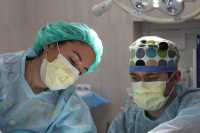
05 Jan Female Surgeons Face Reproductive Hazards in the Operating Room

Dr. Anderson
MedicalResearch.com Interview with:
Matilda Anderson MBBS MBS
General Surgery Trainee/Public Health/Researcher
Footscray, Victoria, Australia
MedicalResearch.com: What is the background for this study?
Response: Female representation in the surgical workforce is increasing. Previous studies have shown higher infertility rates and adverse pregnancy outcomes in this population. We aimed to accurately define the available research in this area and provide some basic recommendations about how workplaces can support their female surgical residents and surgeons.
On a more personal note- Dr Anderson is a female surgical resident and have seen countless pregnant colleagues remove themselves from operating rooms with the concern about how the conditions may affect their pregnancies. Dr. Anderson met Associate Professor Goldman at Harvard University (a leading expert on occupational reproductive hazards) and collaborated to explore this area further.
MedicalResearch.com: What should readers take away from your report?
Response: Occupational hazards in the operating room may be contributing to increased rates of infertility and adverse pregnancy outcomes in female surgeons. Workplaces should be active in informing pregnant surgeons of risks, providing protective measures in accordance with existing guidelines, as well as being flexible in providing alternate duties as appropriate. Policies in this area should also not unfairly restrict pregnant surgeons.
MedicalResearch.com: What recommendations do you have for future research as a result of this work
Response: Prospective studies are required to accurately document fertility and pregnancy outcomes in surgeons. Introduction of new operating room techniques should be scrutinized as to how they may affect the fertile workforce and adequate protective measures must be in place.
MedicalResearch.com: Is there anything else you would like to add?
Response: The surgical profession encourage female surgeons to complete their training and increase gender equality in the workplace. Supporting their work during pregnancies is an essential part of this.
We have no major disclosures
Citation:
Anderson M, Goldman RH. Occupational Reproductive Hazards for Female Surgeons in the Operating Room: A Review. JAMA Surg. Published online January 02, 2020. doi:https://doi.org/10.1001/jamasurg.2019.5420
JOIN OUR EMAIL LIST
[mailpoet_form id="5"]We respect your privacy and will never share your details.
Last Modified: [last-modified]
The information on MedicalResearch.com is provided for educational purposes only, and is in no way intended to diagnose, cure, or treat any medical or other condition. Always seek the advice of your physician or other qualified health and ask your doctor any questions you may have regarding a medical condition. In addition to all other limitations and disclaimers in this agreement, service provider and its third party providers disclaim any liability or loss in connection with the content provided on this website.
Last Updated on January 5, 2020 by Marie Benz MD FAAD
